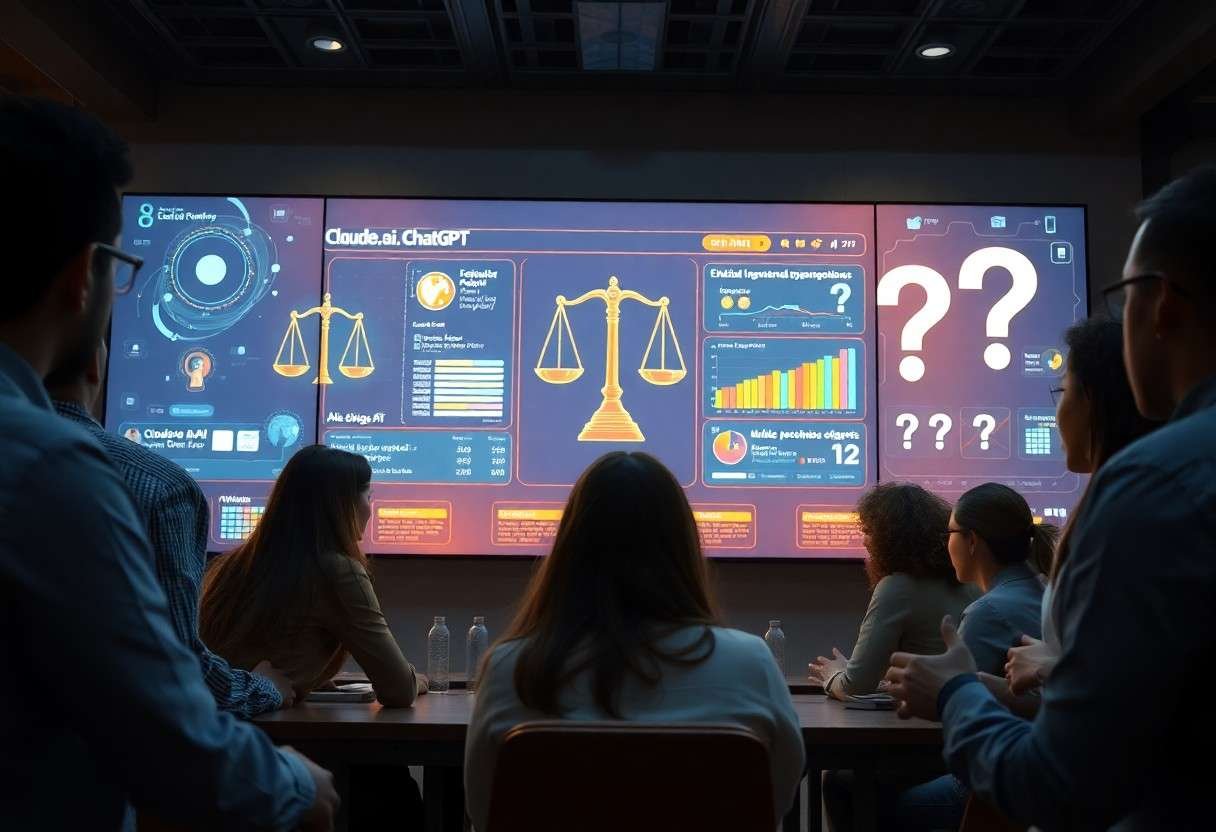As you navigate the rapidly evolving landscape of artificial intelligence, you’re likely wondering how tools like Claude.ai and ChatGPT are tackling the ethical dilemmas that surround them. Your concerns are valid, given the potential impact of these technologies on your daily life and society as a whole. You may be asking yourself whether these AI tools are being designed with your well-being in mind, and what measures are being taken to ensure they serve your best interests.

Key Takeaways:
- AI tools like Claude.ai and ChatGPT are addressing ethical concerns by implementing transparency and accountability measures, such as providing clear explanations for their decision-making processes and being open about their potential bias and limitations.
- These AI tools are also addressing privacy concerns by ensuring that user data is protected and anonymized, and by providing users with control over their personal information and how it is used.
- Furthermore, Claude.ai and ChatGPT are working to address fairness and inclusivity concerns by actively seeking to mitigate bias in their algorithms and ensuring that their outputs are respectful and inclusive of diverse perspectives and communities.
Emerging Concerns
Among the various issues surrounding AI tools, you will find that ethical concerns are becoming increasingly prominent, and as you probe deeper, you will notice that these concerns are multifaceted, affecting various aspects of your interaction with these tools.
Privacy Issues
Besides the benefits that AI tools like Claude.ai and ChatGPT offer, you should consider the potential risks to your personal data, as you navigate through the complex landscape of AI-driven services, you will encounter concerns about how your information is being used and protected.
Bias and Discrimination
About the fairness of AI decision-making processes, you might wonder whether these tools are impartial, and as you examine the issue more closely, you will find that bias and discrimination are significant concerns that need to be addressed to ensure that these tools serve your needs without prejudice.
Another aspect of bias and discrimination in AI tools is the potential for perpetuating existing social inequalities, and as you consider this issue, you will see that it is vital to develop strategies to mitigate these risks, ensuring that these tools are fair and unbiased, and that they do not unfairly impact certain groups of people, thereby affecting your trust in these technologies.
Addressing Transparency
There’s a growing need for transparency in AI tools, and you can learn more about this at Claude AI’s Ethics: Safe Conversations (2025), which sheds light on the importance of ethical considerations. As you explore AI tools like Claude.ai and ChatGPT, you’ll find that transparency is key to building trust.
Explainable AI
Behind the scenes, explainable AI is working to provide insights into the decision-making processes of these tools, allowing you to understand how they arrive at their conclusions. This is important for building trust in AI systems.
Model Interpretability
Below the surface of AI tools, model interpretability is helping to make complex models more understandable, enabling you to see how they work and make decisions.
And as you examine deeper into model interpretability, you’ll find that it’s an important aspect of transparent AI, allowing you to understand the strengths and limitations of these tools, and make informed decisions about their use in your life. You’ll be able to see how the models are trained, and what data they’re based on, giving you a clearer understanding of their potential biases and limitations.
Regulatory Frameworks
Once again, you find yourself at the forefront of a technological revolution, and the development of AI tools like Claude.ai and ChatGPT is no exception, as you consider the ethical implications of these innovations.
Existing Laws and Regulations
For instance, you will notice that current laws and regulations are being applied to AI tools, with governments and organizations establishing guidelines to ensure accountability and transparency in their development and use.
Future Developments
Against this backdrop, you can expect significant changes in the regulatory landscape, as you navigate the complexities of AI development and its applications.
Even as you consider the potential benefits of AI tools, you must also think about the potential risks and challenges that lie ahead, and how regulatory frameworks will need to adapt to address concerns around data privacy, bias, and accountability, in order to ensure that these technologies are developed and used in ways that align with your values and promote the greater good.
Human Oversight and Accountability
Not all AI tools are created equal, and as you consider the ethical implications of using them, you’ll want to look for those that prioritize human oversight and accountability.
Human-in-the-Loop Systems
Among the key features of AI tools like Claude.ai and ChatGPT are human-in-the-loop systems, which allow you to review and correct their outputs, ensuring that their responses align with your values and standards.
Responsibility and Liability
Accountability is a major concern when it comes to AI tools, and as you use them, you’ll want to consider who is responsible when something goes wrong, and how you can hold them liable for any mistakes or harm caused.
Further, as you research deeper into the world of AI, you’ll find that the question of responsibility and liability is complex, and you’ll need to carefully consider the terms of service and user agreements to understand your rights and obligations, and to ensure that you’re using these tools in a way that is transparent, fair, and just.
Mitigating Risks
Unlike other technologies, AI tools like Claude.ai and ChatGPT are taking proactive steps to address ethical concerns, ensuring your interactions with them are safe and trustworthy.
Data Protection
To safeguard your personal information, these AI tools implement robust security measures, protecting your data from unauthorized access and potential misuse, giving you peace of mind as you engage with them.
Fairness and Equity
Above all, fairness is a key consideration for these AI tools, as they strive to provide unbiased and equitable responses to your queries, avoiding any potential discrimination or prejudice.
With fairness and equity in mind, you can expect these AI tools to continually assess and improve their performance, ensuring that your experiences with them are not only informative but also respectful and considerate of your individual perspectives and needs, allowing you to navigate complex topics with confidence and trust in the information provided.
Future Directions
For a deeper understanding of AI tools, you can explore discussions like Why are AI tools like Claude or ChatGPT amazing at generating human-like text? to uncover their potential.
Research and Development
Towards advancing AI ethics, you will see investments in research to improve transparency and accountability, enabling you to make informed decisions about AI tools like Claude.ai and ChatGPT.
Collaboration and Standardization
With the growth of AI, you will witness increased collaboration among developers, policymakers, and users to establish standards for ethical AI development, ensuring your safety and privacy.
But as you research into the world of AI collaboration and standardization, you will find that balancing innovation with regulation is a complex task, requiring your active participation in shaping the future of AI tools like Claude.ai and ChatGPT.

Final Words
Conclusively, as you weigh the benefits of AI tools like Claude.ai and ChatGPT, you must consider how they address ethical concerns. You see your own values reflected in the measures they take to mitigate bias and ensure transparency. Your trust in these tools grows as you understand their commitment to accountability and your privacy. You are the guardian of your own data, and it is reassuring to see AI tools prioritizing your well-being in their development.
FAQ
Q: What steps are AI tools like Claude.ai and ChatGPT taking to address concerns about bias and fairness in their responses?
A: AI tools like Claude.ai and ChatGPT are taking several steps to address concerns about bias and fairness in their responses. These include implementing diverse and representative training datasets, using techniques such as debiasing and data augmentation to reduce the impact of biased data, and conducting regular audits to identify and mitigate any biases that may exist. Additionally, these tools are being designed with transparency and explainability in mind, allowing users to understand how the AI arrived at a particular response and providing mechanisms for reporting and correcting any biased or unfair outputs.
Q: How are AI tools like Claude.ai and ChatGPT ensuring the privacy and security of user data, particularly in light of increasing concerns about data breaches and cyber attacks?
A: AI tools like Claude.ai and ChatGPT are prioritizing the privacy and security of user data by implementing robust security measures such as encryption, secure authentication protocols, and access controls. These tools are also being designed with data minimization and purpose limitation in mind, ensuring that only the minimum amount of data necessary to provide the service is collected and processed. Furthermore, these tools are complying with relevant data protection regulations and standards, such as GDPR and CCPA, and are providing users with clear and transparent information about how their data is being used and protected.
Q: What mechanisms are in place to prevent AI tools like Claude.ai and ChatGPT from being used for malicious purposes, such as generating misinformation or engaging in online harassment?
A: AI tools like Claude.ai and ChatGPT are being designed with safety and responsibility in mind, and several mechanisms are in place to prevent them from being used for malicious purposes. These include content moderation and filtering mechanisms to detect and prevent the generation of harmful or offensive content, as well as user reporting and feedback mechanisms to identify and address any misuse. Additionally, these tools are being developed with clear guidelines and policies for use, and are being integrated with human oversight and review processes to ensure that they are being used in a responsible and ethical manner. These tools are also continuously learning and improving, allowing them to adapt to new forms of misuse and stay ahead of potential threats.











